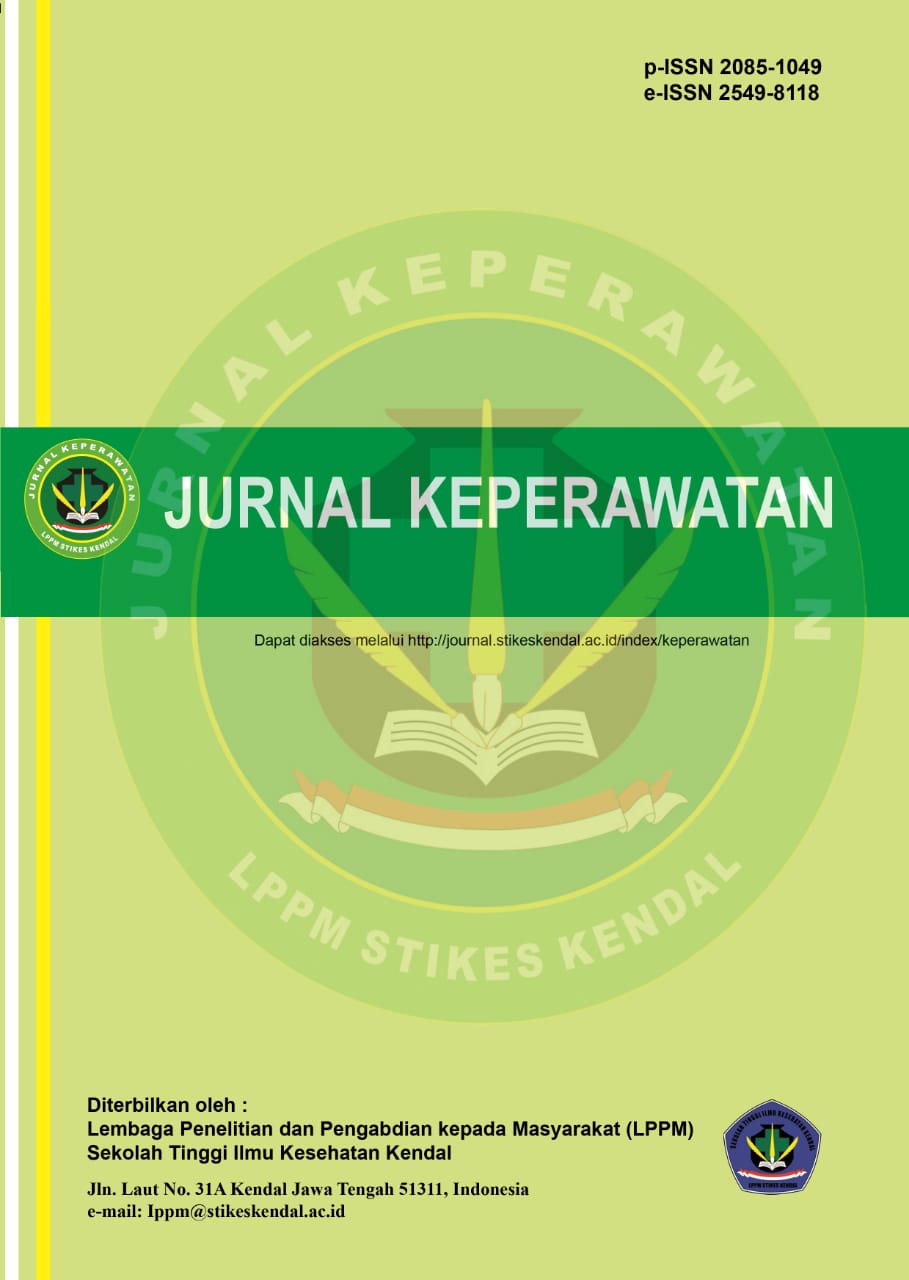The Effect of Health Education using “Module on Mental Health for Children and Adolescents” Media on Mental Health Knowledge of Health Cadres
DOI:
https://doi.org/10.32583/keperawatan.v16i2.1803Keywords:
adolescents, children, health cadres, mental health, moduleAbstract
Detection of mental health in children and adolescents is essential for the next stage of growth and development, this is done to prevent and minimize disturbances so that when children and adolescents face problems, they can survive. The study aimed to determine the effect of health education using “Module on Mental Health for Children and Adolescents” media on the mental health knowledge of Health Cadres In Suro Village. This study used a pre-experimental design, one group pretest, and a posttest involving 40 health cadres in Suro Village in 2022. The total sampling technique was used because the population was less than 100. Data were collected using mental health knowledge questionnaires tested for validity and reliability by researchers. Univariate analysis was used to describe the characteristics of health cadres, and knowledge of cadres before and after health education. In contrast, bivariate analysis was conducted to determine health education’s effect on increasing knowledge of health cadres using the mental health module. The results showed that the majority of cadres were 25-36 years old (37.5%), the last education was junior high school (47,5%), they were housewives (70%), and the length of service as cadres was 1-10 years (60%). The Wilcoxon test results obtained a p-value of 0.000<0.05, meaning that there was a significant change in the level of knowledge after health education was carried out. “Module on Mental Health for Children and Adolescents” can be used to increase mental health knowledge among Health Cadres.
References
Akhmadi, Sunartini, Haryanti, F., Madyaningrum, E., & Sitaresmi, M. N. (2021). Effect of care for child development training on cadres’ knowledge, attitude, and efficacy in Yogyakarta, Indonesia. Belitung Nursing Journal, 7(4). https://doi.org/https://doi.org/10.33546/bnj.1521
Baroroh, H. N., Utami, E. D., Maharani, L., & Mustikaningtias, I. (2016). Peningkatan Pengetahuan Masyarakat Melalui Edukasi Tentang Penggunaan Antibiotik Bijak dan Rasional The Improving Knowledge of Community Through Education About the Use of Antibiotics Wisely and Rationally 2014 ) dalam Antimicrobial Resistance : Global As. Ad-Dawaa Jour.Pharm.Sci., 1(1), 8–15.
Day, C. (2015). Editorial: Child and adolescent mental health: A global challenge. Child and Adolescent Mental Health, 20(1), 1–2. https://doi.org/10.1111/camh.12087
Dharmawati, I. G. A. A., & Wirata, I. N. (2016). Hubungan Tingkat Pendidikan, Umur, Dan Masa Kerja Dengan Tingkat Pengetahuan Kesehatan Gigi Dan Mulut Pada Guru Penjaskes Sd Di Kecamatan Tampak Siring Gianyar. Jurnal Kesehatan Gigi, 4(1), 1–5.
Herawati, I., & Hidayat, A. (2020). Quarterlife Crisis Pada Masa Dewasa Awal di Pekanbaru. Journal An-Nafs: Kajian Penelitian Psikologi, 5(2), 145–156. https://doi.org/10.33367/psi.v5i2.1036
Jaftoran, E. A., Keliat, B. A., & Wardani, I. Y. (2021). Nursing intervention, family’s role, cadre’s role and medical services: Case series on client with hallucination and self-care deficit. Enfermeria Clinica, 31, S180–S184. https://doi.org/10.1016/j.enfcli.2020.12.018
Kemenkes. (2011). Pedoman Umum Pelayanan Posyandu. In Kementrian Kesehatan RI (Vol. 5, Issue 2).
Kementerian Kesehatan RI. (2019). Situasi Kesehatan Jiwa Di Indonesia. In InfoDATIN (p. 12).
Maknunah, A., Risdayati, D., & Si, M. (2017). Unction of the Family (Study of Functions in Husband’S Family Players in Sub Kerumutan Polygamy the Pelalawan Regency). Jom Fisip, 4(2), 1–12.
Meidiana, R., Simbolon, D., & Wahyudi, A. (2018). Pengaruh Edukasi melalui Media Audio Visual terhadap Pengetahuan dan Sikap Remaja Overweight. Jurnal Kesehatan, 9(3), 478. https://doi.org/10.26630/jk.v9i3.961
Mubasyiroh, R., Yunita, I., & Putri, S. (2017). Mental Emotional Symptoms’ Determinants Of Junior-Senior High School Student In Indonesia 2015. Buletin Penelitian Kesehatan, 45(2), 103–112. http://dx.doi.org/10.22435/bpk.v45i2.5820.103-112
Notoatmodjo, S. (2018). Metodologi penelitian kesehatan (Ed.rev). Rineka. https://doi.org/https://opac.perpusnas.go.id/DetailOpac.aspx?id=108837
O’Brien, J. M., Chan, J. S., & Setti, A. (2020). Audio-Visual Training in Older Adults: 2-Interval-Forced Choice Task Improves Performance. Frontiers in Neuroscience, 14(November), 1–11. https://doi.org/10.3389/fnins.2020.569212
Panni, T., Marbun, K., & Santoso, I. (2021). Pentingnya Motivasi Keluarga Dalam Menangani Orang Dengan Gangguan Jiwa (Odgj). 9(July), 1–23.
Putri, & Fernanda, A. (2018). Pentingnya Orang Dewasa Awal Menyelesaikan Tugas Perkembangannya. SCHOULID: Indonesian Journal of School Counseling, 3(2), 35. https://doi.org/10.23916/08430011
Ramos, C. F. V., Araruna, R. da C., Lima, C. M. F. de, Santana, C. L. A. de, & Tanaka, L. H. (2018). Education practices: research-action with nurses of Family Health Strategy. Revista Brasileira de Enfermagem, 71(3), 1144–1151. https://doi.org/10.1590/0034-7167-2017-0284
Sandiyani, R. A. (2021). Lama Menjadi Kader, Frekuensi Pelatihan, Pengetahuan Gizi, dan Sikap Kader Posyandu dengan Perilaku Penyampaian Informasi tentang Pesan Gizi seimbang. Jurnal Kedokteran Undip, 37.
Sari, D. F. (2019). Pengaruh Pendidikan Kesehatan Dengan Media Video Tentang Personal Hygiene Terhadap Tingkat Kemandirian Pada Anak Retardasi Mental Di Sekolah Luar Biasa Siwi Mulia Kota Madiun. In Skripsi. http://repository.stikes-bhm.ac.id/645/1/1.pdf
Sari, I. R. (2018). Hubungan Pengetahuan Kader Tentang Tugas dan Fungsi Posyandu Dengan Keaktifan Kader di Wilayah Kerja Puskesmas Lombakasih Kabupaten Bomban.
Shahar, S., Shahar, H. K., Muthiah, S. G., & Mani, K. K. C. (2022). Evaluating Health Education Module on Hand, Food, and Mouth Diseases Among Preschoolers in Malacca, Malaysia. Frontiers in Public Health, 10(March), 1–15. https://doi.org/10.3389/fpubh.2022.811782
Sugiyono. (2016). Metode Penelitian Kuantitatif, Kualitatif Dan R&D. Penerbit Alfabeta. https://library.nusaputra.ac.id:443/index.php?p=show_detail&id=981%0Ahttps://library.nusaputra.ac.id:443/images/docs/11.jpg.jpg
Tinambunan, D., Agniaty, N., Ekayuni, Y., & Suryani, A. O. (2021). Persoalan Perkembangan dan Kesehatan Mental Anak Usia 6-12 Tahun pada Masa Pandemi COVID-19:Analisis Hasil-hasil Penelitian Lintas Budaya. Unusia Conference, 01(01), 13–28.
Turner, K. H., Jolls, T., Hagerman, M. S., O’Byrne, W., Hicks, T., Eisenstock, B., & Pytash, K. E. (2017). Developing digital and media literacies in children and adolescents.
Downloads
Published
How to Cite
Issue
Section
License
Copyright (c) 2023 Jurnal Keperawatan

This work is licensed under a Creative Commons Attribution-NonCommercial-NoDerivatives 4.0 International License.




